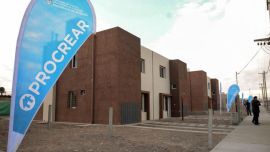The death of Santiago Maldonado in August 2017 has been “clarified” and, as such, his family should take charge of their own legal costs, Security Minister Patricia Bullrich said Wednesday.
Maldonado went missing on August 1 near the Chubut river where his body was found 73 days later.
The 27-year-old artisan has been participating in a road block with a group of militant Mapuches who were protesting over claimed ancestral land currently in the hands of Italian clothing designer Luciano Benetton.
The case is currently being treated as a “forced disappearance followed by death”, a charge that places responsibility for Maldonado’s death with the Border Patrol officers who acted to displace the road block that day.
Bullrich told Radio 10’s El Ángel programme on Wednesday that the judge presiding over the case, Gustavo Lleral, should now “help us to change the charges surrounding this episode”.
She also responded to recent revelations that the Maldonado family was receiving subsidies from the State in order to cover their legal costs.
The charges require that the “Justice Ministry help the family of Santiago Maldonado” in the form of subsidies to cover their legal costs, Bullrich explained.
“The objective of the law is that a victim has the right to a legal process and should be in conditions to approach it with lawyers, with the help of the State. Before it was different: the accused enjoyed the legal defence offered by the State and not the victim”, she added.
“Perhaps in this case, given that the issue has been clarified, we might reconsider the situation”.
CONTROVERSY
The death of Santiago Maldonado remains a sensitive topic in Argentina.
At the time of his disappearance, human rights groups were quick to declare the case a “forced disappearance” and compared what had allegedly happened to Maldonado on August 1, 2017 with the disappearances carried out by the Armed and Security Forces during the 1976-1983 dictatorship.
The Security Ministry was quick to defend the Border Patrol, with Bullrich herself declaring that she was not willing “to throw anyone under the bus” (referring to Border Patrol officers) to placate the tension surrounding Maldonado's disappearance.
When the young man's body eventually appeared in the Chubut river 73 days later, an autopsy on his body found that he had died from “asphyxia after being submerged” and showed no signs of violence. The government used the result to further dismiss accusations against the Border Patrol.
However, activists continued standing by the charges of “forced disappearance followed by death”. They argued that, unless he feared for his life, a young man like Maldonado, who did not know how to swim, would not throw himself into an icy river wearing 13 kilogrammes of clothing.
The disappearance was a political nightmare for the Macri government.
President Mauricio Macri’s only contact with the family was a call to Maldonado’s mother two days before the October midterm election, while recordings emerged of phone surveys questioning voters on how much the Maldonado affair would impact their vote.
-TIMES






















Comments